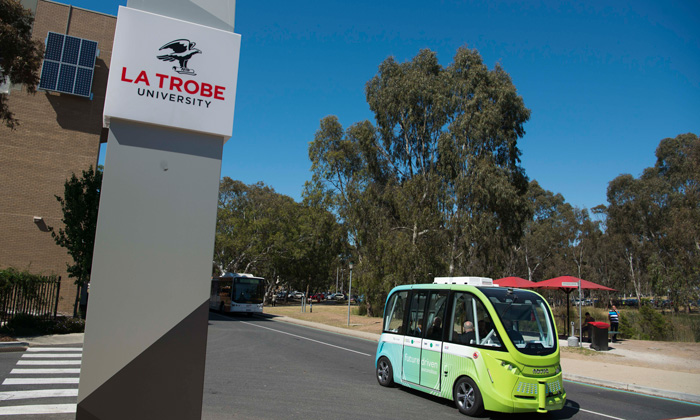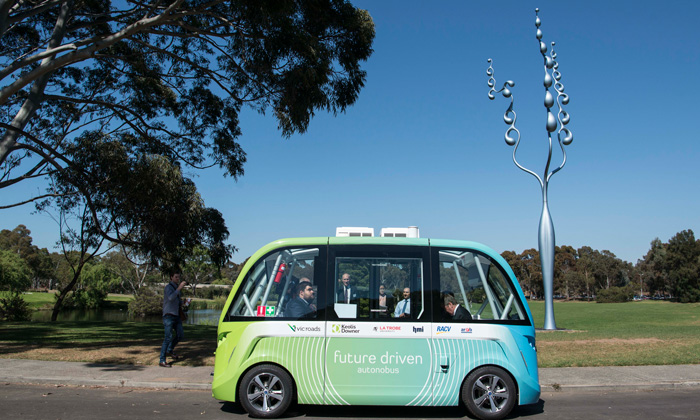Mobilising Melbourne: trialling autonomous last-mile services
- Like
- Digg
- Del
- Tumblr
- VKontakte
- Buffer
- Love This
- Odnoklassniki
- Meneame
- Blogger
- Amazon
- Yahoo Mail
- Gmail
- AOL
- Newsvine
- HackerNews
- Evernote
- MySpace
- Mail.ru
- Viadeo
- Line
- Comments
- Yummly
- SMS
- Viber
- Telegram
- Subscribe
- Skype
- Facebook Messenger
- Kakao
- LiveJournal
- Yammer
- Edgar
- Fintel
- Mix
- Instapaper
- Copy Link
Posted: 22 January 2018 | Scott McCloud | No comments yet
Scott McCloud, from The Royal Automobile Club of Victoria (RACV) discusses how bridging the last-mile transport gap, as well as pushing forward technological excellence within Victoria, was the key driver in the launch of an autonomous shuttle trial in Melbourne.


‘Autonobus’ is the first automated shuttle project in Victoria, Australia and is initiated by VicRoads and Keolis Downer. The La Trobe Autonobus trial will run from April to June 2018 at La Trobe’s Bundoora Campus with project partners including La Trobe University, HMI Technologies, ARRB and The RACV.
Bringing together the private sector, academia and Victoria’s largest mobility member organisation, the project explores the use of driverless buses as part of first- and last-mile connectivity. Autonobus marks a turning point in the juncture between technology, urban planning and mobility solutions. This is important for a city like Melbourne that has a high population spread over low urban density.
La Trobe’s Bundoora Campus is located around 20km north of Melbourne’s Central Business District (CBD). The campus is larger than Melbourne’s CBD and near to public roads; an ideal testing ground. It can test the autonomous vehicle as a bridging solution between campus, transport interchanges and commuters’ final destinations in a near-public, but controlled, environment.


The La Trobe Autonobus trial will run from April to June 2018 at La Trobe’s Bundoora Campus
The purpose of the trial is to bring autonomous vehicles one step closer to operating in a public road environment. To do so the following need to be understood and developed:
- Safety and operational aspects: testing how autonomous vehicles interact with their environments for the development of safety and risk analysis guidelines
- Value proposition and customer experience: establishing the pre- and post-disposition with regards to autonomous vehicles, pre-and post-concerns and the customer experience evaluation among various potential user groups
- Legislation and regulatory hurdles: identifying the gaps and conflict in the relevant legislations and regulations to enable future public operations of autonomous shuttles
- Commercial and liability aspects: developing commercial framework outlining the responsibilities and liabilities between operators and vehicle suppliers whilst supporting third parties such as insurance providers.
Minister for Roads and Road Safety, Luke Donnellan, said the innovative project showed that Victoria is at the forefront of automated vehicle technology: “Automated vehicles will revolutionise how we move around our communities, that’s why we’re investing in trials that explore ways technology can be used to reduce congestion and keep people safe on our roads.”


The La Trobe Autonobus trial will help find sustainable solutions for Melbourne’s public transport.
In Melbourne, 74 per cent of commuters rely on a private motor vehicle to travel to work each day. As Melbourne expands, the congestion on the city’s roads caused by so many private vehicles is unsustainable, as well as environmentally unsound. Therefore, the introduction of last-mile solutions are vital, as they often provide a service where one currently does not exist.
The back-end technology powering the shuttle also has the potential to revolutionise how we travel. The ability to have the shuttle operate ‘on demand’, similar to a service like Uber, ensures that autonomous shuttles meet the expectations of today’s smartphone-driven society.
Another exciting aspect of autonomous shuttles is the ability to transport people who are less mobile, such as the elderly and people with reduced mobility. Like the UK, Australia has a commitment to providing accessibility under our Disability Discrimination Act, and a large part of the trial is understanding how different demographics interact with this new form of transport. The Autonobus trial aims to create best practice guidelines on how this technology can be inclusive for all users.
Lastly, the trial is unique due to the expertise and variety of the key stakeholders. We believe this will lead to tangible outcomes to improve the way we move in Melbourne.
Related topics
Connected & Autonomous Vehicles, Sustainable Urban Transport
Related organisations
ARRB, HMI Technologies, La Trobe University, The Royal Automobile Club of Victoria (RACV)
Related people
Luke Donnellan, Scott McCloud







